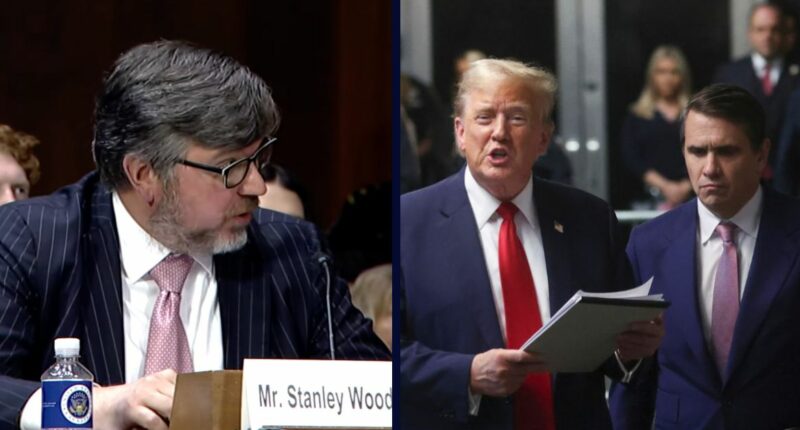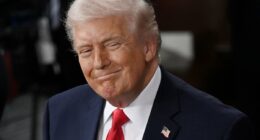Share this @internewscast.com
Left: Stanley Woodward, Jr. speaks during nomination hearing in May 2025 (Sen. Katie Britt/YouTube). Right: Then-candidate Donald Trump speaks to the media, while his lawyer Todd Blanche listens, after the day”s court session for his trial at Manhattan criminal court, Thursday, May 16, 2024, in New York. (Mike Segar/Pool Photo via AP)
In a significant legal development, a recently appointed associate attorney general from the Department of Justice has thrown their support behind Todd Blanche. This comes amid efforts to counter Kilmar Abrego Garcia’s push to compel a former Mar-a-Lago defense lawyer, now a deputy attorney general, to testify under oath. This testimony is being sought through a subpoena ahead of an evidentiary hearing on alleged vindictive prosecution set for next week.
Stanley Woodward, Jr., a prominent lawyer known for representing former President Donald Trump’s co-defendant, Walt Nauta, and FBI Director Kash Patel in separate cases, has taken the lead in this legal battle. On Thursday, Woodward submitted court documents cautioning U.S. District Judge Waverly Crenshaw. He warned that the DOJ is prepared to seek “extraordinary” mandamus relief from the 6th Circuit U.S. Court of Appeals should the judge decide against quashing the subpoenas.
This legal maneuver is detailed in a five-page filing where Woodward stands as the primary signatory. Addressing Judge Crenshaw, an appointee of former President Barack Obama, the document argues against allowing Garcia, a defendant in a smuggling case, to bypass the Trump administration’s claims of executive privilege. The filing warns that compelling testimony from figures like Blanche, Associate Deputy Attorney General Aakash Singh, and Blanche’s advisor, James McHenry, could lead the DOJ to seek a writ of mandamus.
This writ of mandamus is the same legal tool the DOJ previously used to contest a federal judge’s directive requiring a border patrol chief to provide daily updates on force usage in Illinois. It would assert that such a decision by Crenshaw constitutes a “judicial usurpation” or a “clear abuse of discretion.”
The filing states, “It is no answer to say, as Defendant does, that the subpoenas are justified because the Court has concluded that he has shown some evidence of vindictiveness.” It emphasizes that the defendant has not met other critical safeguards necessary for the separation of powers, such as specifically detailing the information sought by the subpoena.
Woodward further argues, “And, in any event, there is no basis for piercing the privileges here, where the evidence establishes that neither the Deputy Attorney General nor anyone in his Office directed” acting U.S. Attorney Robert McGuire’s decision to proceed with the indictment.
Citing the “apex doctrine” to guard against a grilling of Blanche based on his high-ranking status, the DOJ warned that federal courts “have zealously applied this rule to protect the separation of powers, including through the extraordinary writ of mandamus.”
“This case calls for the same result,” Woodward added. “The Deputy Attorney General—the Department’s Number 2—is plainly a high-ranking official protected by the apex doctrine.”
Repeating arguments that Abrego Garcia hasn’t come close to justifying this level of intrusion into the inner workings of the DOJ, Woodward said that if Crenshaw does not quash the subpoenas, the judge should “stay enforcement” so it could seek mandamus relief that would, if granted, put an end to the issue.
As recently as Wednesday, Abrego Garcia’s lawyers needled the high-ranking DOJ officials for being “resolutely unwilling to show up” and not having the “courage to come to Court to defend themselves” and the government’s “motivations” for bringing a criminal case the defense seeks to dismiss.
“[T]he government’s bizarre claim that it is ‘unknown altogether’ what testimony Mr. Blanche might be asked to give is impossible to take seriously,” the filing said. “Mr. Blanche publicly claimed to know all about the motivations for this case. This Court has held that those motivations are a central issue at the upcoming hearing, and has already made clear that Mr. Blanche’s testimony is relevant.”
Then, on Thursday, the defense suggested that Crenshaw should see the DOJ as stonewalling, find that the “presumption” of vindictiveness “stands” and toss out the indictment, perhaps without bothering to hold a hearing on Nov. 4.















